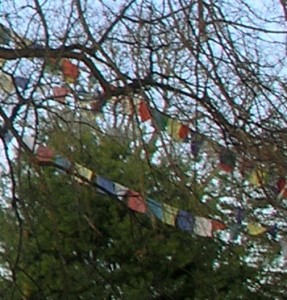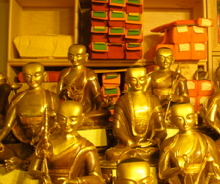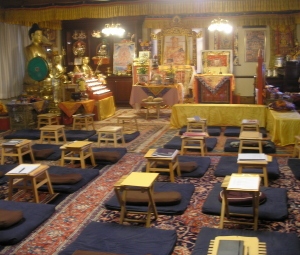
At the Tibetan monastery retreat I attended last month, Ani Kunga led a meditation session for the group about compassion and anger. I said I'd talk about it more: here goes.
Positive > Negative
I'm going to make two assumptions. First, that positive emotions are, in most circumstances, better ones to be feeling. I've never considered anger and its cohorts--hate, irritation, stress, jealousy, and so on--to be very useful emotions, per se: they solve far fewer problems and make a person feel far less happy than any number of positive emotions. This isn't to say that some amount of anger or related emotions isn't ever beneficial--e.g., when down 1-4 in a fencing bout, as motivation to come back and win--just that, overall, I find positive emotions to lead me to be happier and more productive than negative ones. Surprise, surprise.
Second, that people have some amount of control over their emotions. By 'some amount,' I mean that a person tends to have at least some control over his or her environment, as well as some control over what he/she is actively doing in that environment, both of which influence emotions.
Given these premises, and given the choice, why wouldn't a person pick positive emotions over negative ones?
Patience & Anger
As the group of us relaxed into our meditation cushions, enjoying the sunshine and the spring weather, Ani Kunga shared a statement underlying many of the Tibetan Buddhist approaches to dealing with anger:
"If there's something you can do, why are you unhappy? Just do it. If there's nothing you can do, why are you unhappy?"
She proceeded to explain a few methods for dealing with situations involving angry people:
-
Get away from it. Often, removing yourself from the situation can help diffuse it. E.g., physically leaving the room, or mentally removing yourself: watching TV, losing yourself in a book, a drink to take the edge off. This method doesn't always work. Sometimes, ignoring a problem situation only makes it worse.
-
Pretend you're dealing with a sick person; i.e., that the angry person you are dealing with is not mentally all there. This is more to remind you to be patient. Act as if the angry person is your patient and you the doctor, as if he/she is a child and you the parent, or as if you are a student and he/she is your teacher. Yes, that's right: Dealing with angry people is a lesson in patience.
She also explained a core Tibetan Buddhist concept. Patience, Ani Kunga said, is the main antidote for anger. Anger should be turned into compassion, and fear should be turned into love. She led our group through a meditation session to demonstrate a technique for developing compassion. It involved picturing a person you know, imagining his/her happiness and suffering, and then imagining drawing his/her suffering away such that he/she can be happier.
Bottom Line
Although I may not agree with everything Ani Kunga told us, I do (unsurprisingly) like the core message: be proactive. If there's something you can do, just do it. And if there's nothing you can do, well, why not try to spend your time doing things more useful than worrying?







